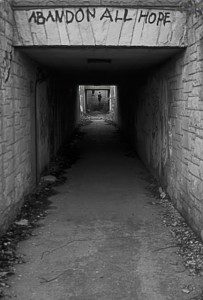A student by the name of Theresa shared in class about how people often have two Instagram accounts. One is filled with beautiful pictures that are available to the entire world. The other account is only for close friends and family members, and includes less appealing, personal representations, possibly free of all filters. We got to thinking: what would it be like if we lived as if we only had one Instagram account free of all filters intended to alter what we really look like?
It also got me to thinking: what if Hell were like anti-social media, where we often hide behind online images or filters or alias monikers that cover our true identities? The only instance in Hell where having no filters would be rewarded is in our critiques of others. John T. Mason defines this use of ‘filter’ as in ‘lacks a filter’ in the following terms:
When someone ‘lacks a filter’, it means that they don’t give consideration to the audience, and often end up saying things that are rude, condescending, or downright mean. Telling someone they are an idiot during a meeting, making a crass comment about another person’s mis-fortune, or cracking an inappropriate joke out loud could all fall into this category (“How To Deal With The Person Who Has No Filter”).
In contrast to Hell, where lacking a filter of this kind would be rewarded, the only kind of filter that would be found and rewarded in Heaven would be that which keeps us from venting malice toward others. It is not the kind of filter that would keep us from covering our true identities, but one that would keep us from confusing and replacing constructive frankness and honesty with downright cruelty, which always aims to tear down and destroy like many online trolls.
People are often more susceptible to operating in an unfiltered out-rage-ous way when resorting to the internet to express their views. Accountability and need for nuanced argumentation often get lost (as does our cool) in cyberspace. The fear also exists that in losing these dynamics, we also lose our humanity.
Of course, there are merits to social forms of media—whereby we actually use media like Facebook or Twitter or Instagram to connect us to one another constructively and relationally. This is especially the case with those we could not otherwise connect with because of separation in time and space. Even so, such cyber connections, no matter how vital, can never replace face-to-face contact.
Now to return to the desire for removing filters that would artificially enhance images of ourselves on Instagram and elsewhere, people often cheat and use #Nofilter to cover flattering alterations. While there is supposedly an online “Faker Catcher” that will tell you if someone is faking (simply post the link to the Instagram photo at filterfakers.com), it is much harder to do that with someone faking alterations in real life. The closer our connections to people in daily life, the harder it is for us to fake or cheat one another with #Nofilter. No wonder many would rather connect with others online. We can keep faking that way.
C.S. Lewis reflects upon Hell as the most anti-social place there is. By contrast, Heaven is the most social of all domains. Lewis’ account of Hell in The Great Divorce portrays Hell in isolationist terms. One analysis of Hell in this book reads,
Lewis’s most detailed depiction of hell occurs in his Dante-like fantasy story The Great Divorce (1946). He images hell as a large, gray city, where it is always rainy and constantly in that stage of twilight just as the lights are being turned on. The narrator walks through empty streets lined with dingy boarding houses, small tobacco shops, windowless warehouses, and “bookshops of the sort that sell The Works of Aristotle” (chap. 1). The narrator joins a queue at a bus stop and boards a bus that takes him to the outskirts of heaven. We don’t see hell again, but we learn more about it as the story continues. The citizens of the city are quarrelsome—fights break out, even on the bus, and we are told that the streets are empty as residents keep moving further away from each other because they can’t stop quarreling with neighbors. We also learn that the city is unsubstantial. One can construct a house or come by various commodities just by thinking them, but the houses can’t keep out rain or intruders and the commodities don’t satisfy needs. Most striking is the fact that, though the gray city seems huge, it actually is tiny—“nearly Nothing” (chap. 9, par. 51). “All Hell is smaller than one pebble of [the] earthly world” (chap. 13, par. 47).
The throw-away trolling opinions that we find online are like the ideas that create meaningless buildings and commodities. We construct these opinions and ideas, as we pull away from one another in the virtual and insignificant city of Lewis’s Hell (a comparative judgment my colleague Derrick Peterson has made).
Like anti-social media, Hell is locked from the inside of our hearts, a point that Lewis makes (The Problem of Pain). Whereas Jesus declares that Hell was not made for us, but for the devil and his angels (Matthew 25:41), for many of us today, “Hell is other people.” In contrast, the doors of Heaven never close (Revelation 21:25), and Heaven is God and other people (Mark 12:30-31).
Perhaps Hell will be nothing more than an infinity of Facebook ‘likes’ and ‘dislikes’ for those who think and don’t think like us respectively, an eternity of surfing the web wherein we get pulled further apart from one another as we are lost in the black hole of cyber outrage, falsely hash-tagging ‘Nofilter,’ seeing no one for who they truly are, and never being truly known. Nothing could be worse. As the inscription at the entrance to Dante’s Hell reads, “All hope abandon, ye who enter here.”
Perhaps Heaven will be nothing more (what more could it possibly be?!) than an eternal communion of finally looking past the dimly lit glass or computer screen, whereby we finally see face to face. There and then we shall know fully, even as we will be fully known (1st Corinthians 13:12). On this view, hope is not lost, for “faith, hope, and love abide, these three; but the greatest of these is love” (1 Corinthians 13:13).














